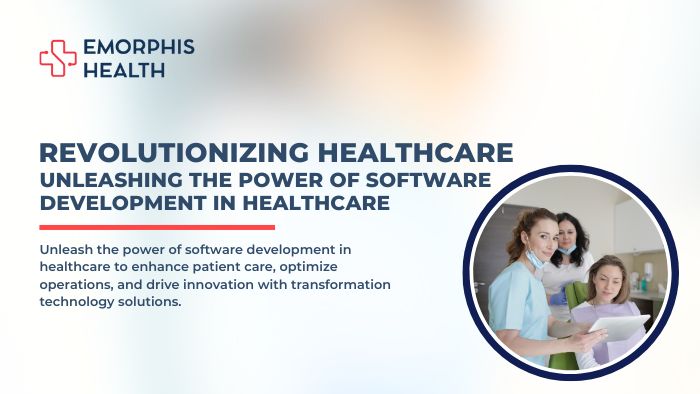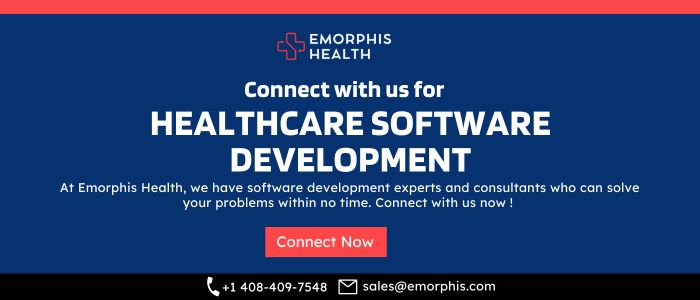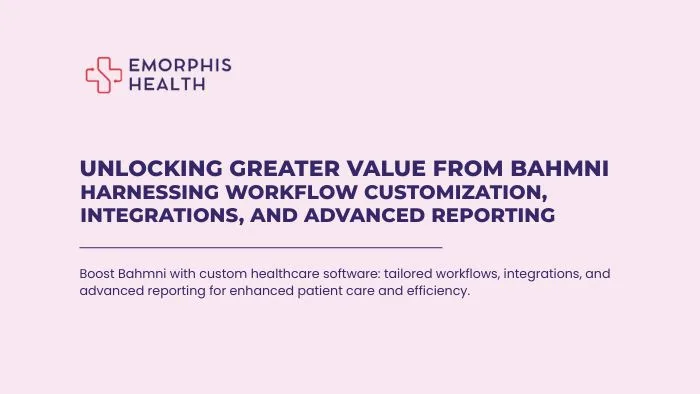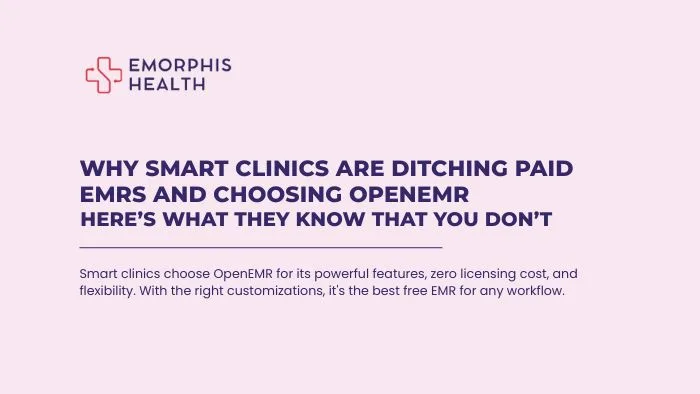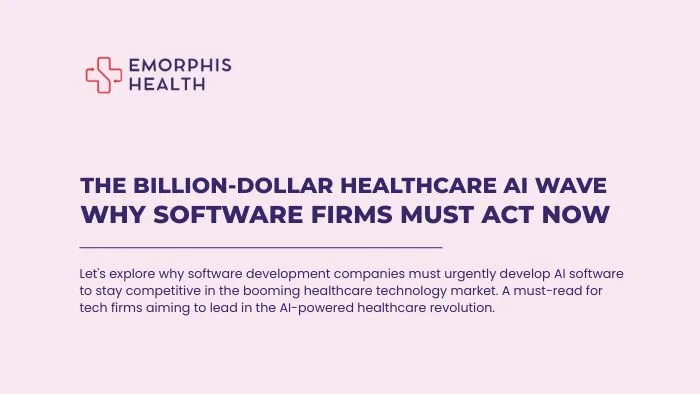The healthcare industry is experiencing a transformative wave, driven by technological advancements and the growing adoption of digital solutions. In this digital era, healthcare software development services play a pivotal role in revolutionizing the way medical services are delivered and managed. From electronic health records to telemedicine platforms, these software applications are reshaping the healthcare landscape, improving patient care, and streamlining healthcare processes.
The digital healthcare market has witnessed remarkable growth in recent years, fueled by increasing demand for accessible and efficient healthcare services. Let’s delve into some trends and facts that highlight the rapid evolution and potential of this dynamic market:
Latest Trends in Healthcare
See Contents
- 1 Latest Trends in Healthcare
- 2 Understanding Healthcare Software Development
- 3 Key Considerations in Healthcare Software Development
- 4 Technologies and Tools in Healthcare Software Development
- 5 Challenges and Solutions in Healthcare Software Development
- 6 Transformative Healthcare Software Applications: Real-world Success Stories
- 7 Future Trends in Healthcare Software Development
- 8 Conclusion
1. Rising Adoption of Telemedicine
Telemedicine, the remote delivery of healthcare services using telecommunication technologies, has gained immense popularity. The COVID-19 pandemic further accelerated its adoption, enabling patients to receive medical consultations and treatment from the comfort of their homes. The global telemedicine market is projected to reach a value of $175.5 billion by 2026, demonstrating its significant impact on healthcare delivery.
2. Emergence of Wearable Devices
Wearable devices, including smartwatches, fitness trackers, and health monitoring devices, are revolutionizing personal healthcare. These devices collect and transmit vital health data, enabling individuals to monitor their well-being and providing valuable insights to healthcare professionals. The wearable healthcare market is projected to surpass $74 billion by 2026, underscoring the growing importance of remote patient monitoring and preventive care.
3. Artificial Intelligence (AI) in Healthcare
AI has emerged as a game-changer in healthcare software development. Machine learning algorithms and AI-powered analytics are being employed to analyze vast amounts of medical data, assist in diagnosing diseases, and predict patient outcomes. AI-driven healthcare applications are poised to transform decision-making processes and enhance precision medicine, offering personalized treatments tailored to each patient’s unique characteristics.
4. Focus on Data Security and Privacy
With the increasing digitization of healthcare records and the exchange of sensitive patient information, ensuring data security and privacy has become paramount. Stricter regulations, such as the Health Insurance Portability and Accountability Act (HIPAA), mandate healthcare organizations to safeguard patient data. Healthcare software developers are incorporating robust security measures, encryption techniques, and strict access controls to protect patient privacy.
5. Interoperability and Integration
As healthcare organizations adopt diverse software applications, achieving interoperability and seamless integration between systems has become crucial. Efforts are underway to develop standardized data exchange formats, such as Fast Healthcare Interoperability Resources (FHIR), to facilitate the secure and efficient sharing of health information across different platforms. Interoperability enables healthcare providers to access comprehensive patient data, leading to better care coordination and informed decision-making.
These trends and facts paint a picture of a rapidly evolving digital healthcare market. The potential for innovation and improvement in patient care through healthcare software development services is immense. In the following sections, we will explore the intricacies of healthcare software development, key considerations, technologies, challenges, and success stories that showcase the transformative impact of these digital solutions.
Understanding Healthcare Software Development
Healthcare software development plays a vital role in revolutionizing the healthcare industry, improving patient care, and enhancing operational efficiency. It involves the creation, implementation, and maintenance of software applications specifically designed for healthcare organizations, clinicians, and patients. Let’s delve deeper into the key aspects of healthcare software development:
A. Definition and Scope
Healthcare software development encompasses the creation of various types of software applications used in the healthcare domain. This includes electronic health records (EHR), practice management systems, telemedicine platforms, medical imaging software, patient portals, and more. These applications are designed to facilitate efficient data management, enhance communication between healthcare providers, and improve overall healthcare delivery.
B. Electronic Health Records (EHR)
EHR systems are at the core of healthcare software development. They digitize and centralize patient health information, making it easily accessible to authorized healthcare professionals. EHRs enable clinicians to view patient histories, track medication records, record diagnoses, and treatments, and streamline documentation processes. They improve care coordination, reduce medical errors, and enhance patient safety.
C. Practice Management Systems
Practice management systems are software solutions that streamline administrative tasks in healthcare settings. They facilitate appointment scheduling, billing and invoicing, insurance claims processing, and inventory management. These systems improve operational efficiency, minimize paperwork, and optimize resource utilization, allowing healthcare providers to focus more on patient care.
D. Telemedicine Platforms
Telemedicine platforms have gained significant prominence, especially with the advent of remote healthcare services. These platforms enable healthcare providers to conduct virtual consultations, diagnose conditions, monitor patients remotely, and prescribe treatments. Telemedicine software facilitates real-time communication between patients and healthcare professionals, providing convenient and accessible healthcare services, particularly in rural or underserved areas.
Learn more about Telemedicine app development solutions
E. Medical Imaging Software
Medical imaging software plays a crucial role in healthcare diagnosis and treatment. These software applications enable the capture, storage, analysis, and interpretation of medical images such as X-rays, CT scans, MRI scans, and ultrasounds. Advanced imaging software employs algorithms and AI techniques to enhance image quality, assist in automated analysis, and aid in the early detection of diseases.
F. Patient Portals
Patient portals are secure online platforms that allow patients to access their medical records, view test results, request appointments, and communicate with healthcare providers. These portals empower patients to actively participate in their healthcare management, fostering engagement and improving patient-provider communication. Patient portals also enable healthcare organizations to deliver personalized health education materials and facilitate remote monitoring.
Healthcare software development brings numerous benefits to healthcare organizations, clinicians, and patients. It enhances care coordination, improves communication, reduces administrative burdens, and promotes evidence-based decision-making. As technology continues to advance, healthcare software applications are becoming increasingly sophisticated, integrating AI, machine learning, and predictive analytics to deliver more precise diagnoses and personalized treatment plans.
In the next section, we will delve into the key considerations involved in healthcare software development, including privacy and security, compliance, and user experience design. Understanding these considerations is crucial for developing high-quality and effective healthcare software applications.
Key Considerations in Healthcare Software Development
Developing healthcare software requires careful attention to various factors to ensure the delivery of secure, compliant, and user-friendly applications. Let’s explore the key considerations that play a crucial role in healthcare software development:
i) Privacy and Security
Protecting patient data is of paramount importance in healthcare software development services. Healthcare organizations must adhere to strict privacy regulations, such as the Health Insurance Portability and Accountability Act (HIPAA) in the United States. Developers need to implement robust security measures, including data encryption, access controls, and audit trails, to safeguard patient information. Regular security assessments and vulnerability testing are essential to identify and address potential threats.
ii) Compliance with Regulations
Healthcare software developers must be well-versed in the regulatory landscape governing healthcare information systems. Compliance with regulations like HIPAA, General Data Protection Regulation (GDPR), and the European Medical Device Regulation (MDR) is crucial to ensure the legal and ethical handling of patient data. Developers need to incorporate the necessary features and safeguards to meet these regulatory requirements and ensure data privacy.
iii) User Experience (UX) Design
User experience design plays a vital role in healthcare software development. Applications need to be intuitive, user-friendly, and tailored to the needs of both healthcare professionals and patients. A well-designed user interface (UI) and seamless workflows enhance usability, reduce user errors, and improve overall satisfaction. User-centered design methodologies, such as conducting usability testing and gathering feedback from end-users, should be integrated into the development process to create intuitive and efficient software applications.
iv) Integration and Interoperability
Healthcare organizations typically employ multiple software systems for various functions, such as EHRs, billing systems, and laboratory management software. Ensuring interoperability and seamless integration between these systems is critical to enable efficient data exchange and streamline workflows. Developers should utilize standards like HL7 (Health Level Seven) and FHIR (Fast Healthcare Interoperability Resources) to facilitate data sharing and interoperability between different healthcare software applications.
v) Scalability and Performance
Healthcare software applications must be designed to handle increasing volumes of data and user traffic. Scalability is crucial to accommodate the growing demands of healthcare organizations. Developers should employ scalable architecture, efficient database designs, and cloud computing technologies to ensure optimal performance and responsiveness, even under heavy usage.
vi) Usability Testing and Quality Assurance
Rigorous testing and quality assurance processes are vital in healthcare software development. Usability testing should involve real users to identify any usability issues, gather feedback, and refine the user experience. Quality assurance should encompass thorough testing for functional correctness, performance, security, and compliance. Testing should cover all aspects, including integrations with external systems and mobile device compatibility.
By considering these key factors throughout the development lifecycle, healthcare software developers can deliver high-quality applications that meet the unique needs of the healthcare industry. Prioritizing privacy, security, compliance, user experience, interoperability, and performance ensures that the software applications are reliable, efficient, and user-friendly.
In the next section, we will explore the technologies and tools commonly used in healthcare software development services. Understanding these technologies will help developers leverage the latest advancements to create innovative healthcare software solutions.
Technologies and Tools in Healthcare Software Development
Healthcare software development services rely on a range of technologies and tools to create robust, secure, and innovative applications. Let’s explore some of the key technologies and tools that are commonly utilized in the development of healthcare software:
a) Cloud Computing
Cloud computing has revolutionized the healthcare industry by providing scalable and cost-effective solutions. Cloud-based platforms and services enable healthcare organizations to store and access vast amounts of data securely. They also offer flexibility in terms of resource allocation and facilitate seamless collaboration among healthcare professionals. Cloud computing providers, such as Amazon Web Services (AWS) and Microsoft Azure, offer a variety of services tailored to the specific needs of healthcare software development.
b) Application Programming Interfaces (APIs)
APIs play a crucial role in enabling integration and interoperability between different healthcare software systems. APIs allow different applications to communicate and exchange data securely. Standards like HL7 (Health Level Seven) and FHIR (Fast Healthcare Interoperability Resources) provide specifications and guidelines for building healthcare APIs, ensuring seamless data exchange between systems and facilitating efficient interoperability.
c) Electronic Health Records (EHR) Systems
EHR systems serve as the foundation of healthcare software development. These systems leverage databases and data storage technologies to capture, store, and manage patient health records securely. Popular database management systems (DBMS) used in EHR development include MySQL, Oracle, and Microsoft SQL Server. Developers employ advanced data modeling techniques to design EHR databases, ensuring efficient data retrieval and optimized performance.
d) Artificial Intelligence (AI) and Machine Learning (ML)
AI and ML technologies have immense potential in healthcare software development. These technologies can analyze vast amounts of healthcare data to identify patterns, make predictions, and support clinical decision-making. AI and ML algorithms are utilized in areas such as medical imaging analysis, predictive analytics, risk assessment, and personalized medicine. Frameworks like TensorFlow and libraries like scikit-learn and Keras provide developers with the necessary tools to implement AI and ML in healthcare software applications.
e) Mobile App Development
Mobile applications have become integral to healthcare software development, enabling clinicians and patients to access healthcare services on the go. Mobile app development frameworks such as React Native and Flutter offer cross-platform capabilities, allowing developers to build applications for both iOS and Android devices simultaneously. These frameworks streamline the development process and ensure a consistent user experience across different mobile platforms.
f) Security and Privacy Tools
Healthcare software developers must incorporate robust security and privacy tools to protect patient data. Tools like encryption libraries, secure socket layers (SSL), and access control mechanisms are employed to safeguard sensitive information. Security testing tools, such as penetration testing frameworks and vulnerability scanners, help identify potential security weaknesses and ensure compliance with privacy regulations.
Staying up-to-date with the latest technologies and leveraging appropriate tools empowers healthcare software developers to create innovative solutions that enhance patient care, streamline workflows, and improve healthcare outcomes.
In the next section, we will discuss the challenges often faced in healthcare software development services and potential solutions to overcome them. Understanding these challenges is crucial for successful project execution and delivery of high-quality healthcare software applications.
Challenges and Solutions in Healthcare Software Development
Developing healthcare software comes with its own set of challenges. Understanding and addressing these challenges are crucial for successful project execution and the delivery of high-quality healthcare software applications. Let’s explore some common challenges faced in healthcare software development services and potential solutions to overcome them:
1. Regulatory Compliance
Healthcare software developers must navigate a complex regulatory landscape to ensure compliance with privacy and security regulations, such as HIPAA, GDPR, and MDR. It is important to stay up-to-date with the latest regulations and incorporate the necessary safeguards and controls in the software applications. Conducting regular audits and seeking legal expertise can help ensure compliance and mitigate the risk of non-compliance.
2. Data Interoperability
Healthcare organizations often employ various software systems, each with its own data formats and standards. Achieving seamless data interoperability and integration between these systems can be challenging. Adopting standardized protocols, such as HL7 and FHIR, and employing integration technologies, such as APIs and data mapping techniques, can facilitate efficient data exchange and interoperability.
Usability and User Experience
Designing healthcare software applications that are intuitive and user-friendly is essential. Healthcare professionals and patients should find the software easy to navigate and use. Conducting user research, and usability testing, and incorporating feedback from end-users throughout the development process can help identify usability issues and refine the user experience. Applying user-centered design principles and following established UX best practices contribute to creating user-friendly healthcare software.
3. Security and Privacy
Protecting patient data is a top priority in healthcare software development. Building robust security measures, such as data encryption, access controls, and secure authentication mechanisms, helps safeguard sensitive information. Conducting regular security assessments, implementing security frameworks, and following secure coding practices minimize the risk of data breaches and ensure patient privacy.
4. Scalability and Performance
Healthcare software applications should be designed to handle increasing volumes of data and user traffic. Scalability is crucial to accommodate the growing demands of healthcare organizations. Utilizing cloud computing resources, employing scalable architecture, and optimizing database performance contribute to the scalability and performance of healthcare software applications. Regular performance testing and monitoring help identify bottlenecks and optimize system performance.
5. Integration with Legacy Systems
Healthcare organizations may have existing legacy systems that need to be integrated with new software applications. Integration challenges arise due to differences in technology platforms, data formats, and communication protocols. Employing middleware solutions, building adapter modules, and utilizing integration technologies can facilitate seamless integration with legacy systems.
By recognizing these challenges and implementing appropriate strategies, healthcare software developers can overcome obstacles and deliver successful healthcare software applications that meet the needs of healthcare organizations, professionals, and patients.
In the next section, we will explore real-world success stories and examples of healthcare software applications that have made a significant impact on patient care and healthcare outcomes.
Transformative Healthcare Software Applications: Real-world Success Stories
Healthcare software applications have the potential to transform patient care, improve clinical outcomes, and enhance healthcare delivery. Let’s explore some real-world success stories and examples of healthcare software applications that have made a significant impact:
A. Electronic Health Records (EHR) Systems
EHR systems have revolutionized healthcare by centralizing patient health information, streamlining documentation processes, and improving care coordination. For example, Epic Systems, one of the leading EHR vendors, has successfully implemented its EHR system across numerous healthcare organizations, enabling seamless data sharing and enhancing clinical decision-making.
B. Telemedicine Platforms
Telemedicine platforms have emerged as valuable tools, especially during the COVID-19 pandemic, allowing healthcare providers to deliver remote care and consultations. Companies like Teladoc Health and Amwell have developed telemedicine platforms that connect patients with healthcare professionals through video calls, providing convenient access to medical advice, diagnoses, and prescriptions.
C. Medical Imaging Software
Medical imaging software has significantly improved the accuracy and efficiency of diagnosing diseases. Companies like Aidoc have developed AI-powered medical imaging software that analyzes radiology scans, such as CT scans and MRIs, to identify abnormalities and assist radiologists in making faster and more accurate diagnoses.
D. Mobile Health (mHealth) Apps
Mobile health applications empower patients to actively manage their health and access healthcare services on their smartphones. Apps like MyChart by Epic Systems enable patients to view their medical records, schedule appointments, and communicate with healthcare providers securely. These apps enhance patient engagement and enable better self-care.
E. Clinical Decision Support Systems (CDSS)
Clinical decision support systems help healthcare providers make informed decisions by providing evidence-based guidelines and recommendations at the point of care. An example is UpToDate, a widely used CDSS that offers comprehensive medical information and assists clinicians in diagnosing and treating various conditions.
F. Health Monitoring Wearables
Wearable devices, such as fitness trackers and smartwatches, have gained popularity in healthcare. They enable individuals to monitor their health metrics, such as heart rate, sleep patterns, and activity levels. Companies like Fitbit and Apple have incorporated health monitoring features into their wearables, allowing users to track their overall well-being and share data with healthcare providers for more personalized care.
These success stories demonstrate the potential of healthcare software applications to improve patient outcomes, enhance communication between healthcare providers and patients, and streamline healthcare operations.
In the next section, we will discuss the future trends and advancements in healthcare software development. Exploring these trends will provide insights into the exciting possibilities that lie ahead in this rapidly evolving field.
Future Trends in Healthcare Software Development
The field of healthcare software development is continually evolving, driven by advancements in technology and the growing demand for innovative healthcare solutions. Let’s explore some of the future trends and advancements that will shape healthcare software development:
a) Artificial Intelligence (AI) and Machine Learning (ML) in Healthcare
AI and ML will play an increasingly prominent role in healthcare software development. These technologies can assist in analyzing large datasets, predicting disease outcomes, automating administrative tasks, and improving clinical decision-making. AI-powered virtual assistants and chatbots will enhance patient engagement and provide personalized healthcare support.
b) Internet of Medical Things (IoMT)
The IoMT refers to the network of interconnected medical devices and sensors that collect and transmit patient data for analysis and decision-making. IoMT applications include remote patient monitoring, wearable devices, and smart medical devices. Healthcare software developers will need to focus on integrating and securing data from these devices, enabling real-time monitoring and data-driven insights.
c) Blockchain Technology in Healthcare
Blockchain technology has the potential to revolutionize healthcare data management, ensuring security, privacy, and interoperability. Blockchain can enable secure and transparent sharing of patient data across healthcare providers, improve the integrity of medical records, and streamline insurance claims processing. Healthcare software developers will explore blockchain-based solutions for secure data exchange and consent management.
d) Precision Medicine and Genomics
Precision medicine aims to deliver personalized healthcare based on an individual’s unique genetic makeup, lifestyle, and environmental factors. Genomics and molecular data analysis will play a significant role in understanding diseases at a molecular level, enabling targeted treatments. Healthcare software applications will need to integrate genomics data and analytics tools to support precision medicine initiatives.
e) Augmented Reality (AR) and Virtual Reality (VR)
AR and VR technologies have the potential to enhance medical training, surgical planning, and patient education. Healthcare software developers will focus on creating immersive AR and VR experiences to simulate medical procedures, assist in surgical planning, and provide interactive patient education platforms.
f) Data Analytics and Predictive Analytics
The abundance of healthcare data offers opportunities for advanced data analytics and predictive modeling. Healthcare software applications will leverage data mining techniques, predictive analytics algorithms, and visualization tools to derive insights, identify patterns, and support decision-making. These applications will aid in population health management, disease surveillance, and proactive healthcare interventions.
These trends represent the exciting future of healthcare software development services. By embracing these advancements, healthcare organizations can harness the power of technology to improve patient care, enhance operational efficiency, and drive innovation in the healthcare industry.
Conclusion
In conclusion, healthcare software development services are at the forefront of technological advancements in the healthcare industry. By leveraging the power of software, we can overcome challenges, deliver innovative solutions, and improve healthcare outcomes for individuals and communities. As healthcare continues to evolve, the collaboration between healthcare professionals, software developers, and technology experts becomes crucial in harnessing the transformative potential of healthcare software development.
Thank you for joining us on this journey through the world of healthcare software development. Together, let’s continue to innovate and create solutions that positively impact the lives of patients, healthcare providers, and the entire healthcare ecosystem.

